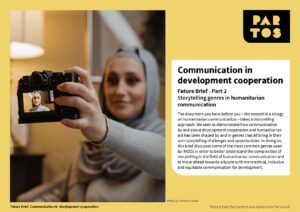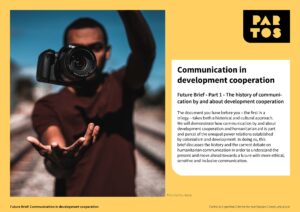
Future Brief #2 – Storytelling genres in humanitarian communication
This Future Brief explores how communication by and about development cooperation has been shaped by genres that all bring in their own storytelling challenges and opportunities. In doing so, this brief discusses some of the most common genres used in the sector in order to better understand the complexities of storytelling and what are, then, the solutions to these storytelling challenges. How can we make our campaigns ethical, inclusive and equitable?
The answer must be sought in a practice of communication in which values such as solidarity, equality and justice are made central. Campaigns that are steeped in the complexity, history and politics, and based on the agency, dignity and humanity of vulnerable people in the global South, are able to contribute to a more just global society. Particularly, two umbrella strategies could be used in the pursuit of ethical, inclusive and equitable communication: postcolonial criticism and participatory storytelling.
…all those involved in communication for development should be equipped with a postcolonial perspective and assess each campaign from this perspective. This means, among other things, taking the various storytelling challenges of the commonly used humanitarian communication genres into consideration, and critically and carefully think about how they could be avoided and overcome – and to abandon a genre altogether if necessary.
Some considerations
- Challenge colonial discourses, stories and stereotypes and avoid a genre altogether if it (re)produces an unequal power relation and harmful representation, mainly concerning poverty porn and white saviorism.
- The genre of the adventure journey and the misery simulation can run the risk of containing colonial representations, now in the form of harmful positive stereotypes.
- The storytelling genre of the individual changemaker allows for (more) visibility, voice and agency for people in the global South, but it can have its challenges as well if focussing on individual solutions for systemic problems. Be aware of simplification and give attention to history, politics and the role of the wider community and civil society that can influence social change.
- In the pursuit of ethical, inclusive and equitable communication, two umbrella strategies could be used: postcolonial criticism and participatory storytelling. Evaluate each campaign from a postcolonial perspective before being produced, and actively include the people that the story is about, both in the process and product.
Future Brief #3: work in progress
In the third and final Future Brief, we will dive deeper into the practice of participatory storytelling and other inclusive creative tools in the production process of communication for development. If you would like to share your experiences on this matter, please reach out to Sera Koolmees.
Download Future Brief (Pt. 2) | Storytelling genres in development cooperation
Download
